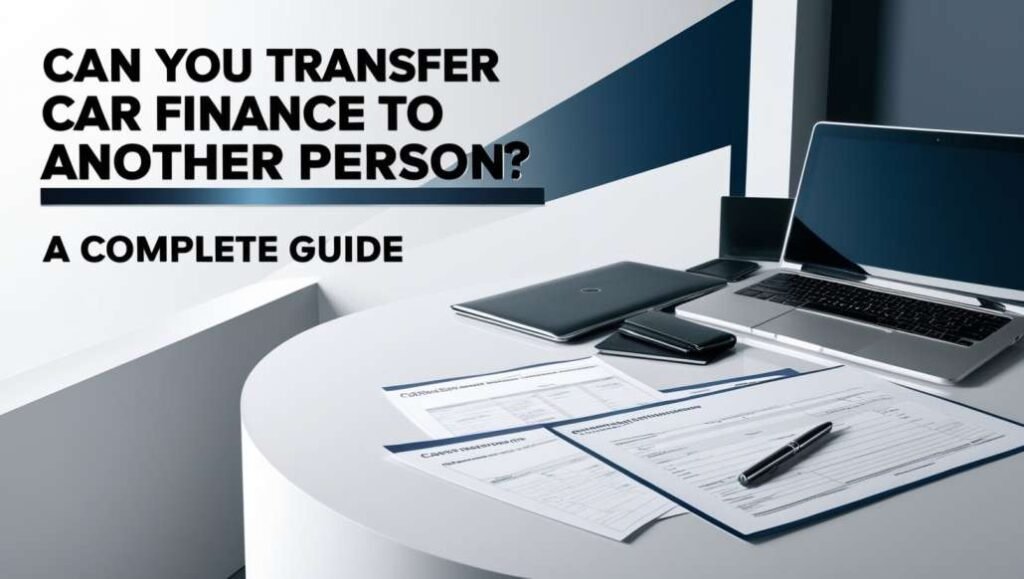Can You Transfer Car Finance to Another Person? A Complete Guide
Car finance agreements are a popular way to affordably purchase vehicles by spreading payments over a specified period. However, circumstances can change, and you may find yourself needing to transfer your car finance agreement to another person. Whether it’s due to financial hardship, a change in lifestyle, or simply not needing the vehicle anymore, transferring car finance can be a viable solution. This article delves into the process of transferring car finance, the conditions required, potential pitfalls, and alternative options to consider.
Is It Possible to Transfer Car Finance?
The first question many ask is whether it is possible to transfer a car finance agreement to another person. The short answer is: it depends. Most car finance agreements, such as Personal Contract Purchase (PCP) or Hire Purchase (HP), are legally binding contracts between you and the lender. These contracts typically stipulate that you cannot transfer the agreement to someone else without the lender’s explicit consent.
Some lenders may allow a transfer, but they will have strict criteria that the new borrower must meet. It’s important to note that not all finance agreements are transferable, so you’ll need to check the terms and conditions of your specific contract. Can You Transfer Car Finance to Another Person? A Complete Guide
Steps to Transfer Car Finance
If your lender permits the transfer of car finance, here are the general steps you need to follow:
1. Review Your Finance Agreement
Start by thoroughly reading your car finance contract. Look for clauses related to transferring the agreement. If it’s unclear, contact your lender directly to ask if a transfer is possible.
2. Find a Suitable Candidate
The next step is to identify someone who is willing and eligible to take over the finance agreement. This could be a friend, family member, or even a third party. The new person will need to pass the lender’s credit and affordability checks.
3. Obtain Lender Approval
Once you’ve found a suitable candidate, both parties will need to contact the lender to initiate the transfer process. The lender will evaluate the new person’s creditworthiness and financial stability to ensure they can meet the repayment obligations.
4. Sign the Necessary Paperwork
If the lender approves the transfer, you and the new borrower will need to sign the required paperwork to finalize the process. This may include a new finance agreement between the lender and the new borrower.
5. Transfer Ownership (if applicable)
In some cases, the ownership of the vehicle may also need to be transferred. For example, if the agreement is a PCP, the car remains the property of the lender until all payments are completed. Check with your lender about how ownership works in your specific case. Can You Transfer Car Finance to Another Person? A Complete Guide
Conditions for Transferring Car Finance
For a car finance transfer to be successful, the following conditions usually apply: Can You Transfer Car Finance to Another Person? A Complete Guide
- Lender Approval: The lender must explicitly allow the transfer and approve the new borrower.
- Good Credit Score: The new borrower must have a credit score that meets the lender’s requirements.
- Affordability Check: The new borrower must demonstrate that they can afford the monthly repayments.
- Current Payments: Your existing account must be up to date with no missed or late payments.
Types of Car Finance and Transferability

Different types of car finance agreements have varying levels of transferability. Here’s a breakdown: Can You Transfer Car Finance to Another Person? A Complete Guide
1. Personal Contract Purchase (PCP)
PCP agreements are among the most popular forms of car finance. Under PCP, you make lower monthly payments but have a balloon payment at the end if you want to own the car. Some lenders may allow you to transfer a PCP agreement, but the new borrower will need to meet strict criteria.
2. Hire Purchase (HP)
In a HP agreement, you’re essentially renting the car until the final payment is made, at which point ownership transfers to you. HP agreements are less commonly transferable, as the lender retains ownership of the car until the end of the term.
3. Personal Loans
If you used a personal loan to purchase the car outright, the car is legally yours, and the loan cannot be transferred to another person. In this case, you may need to sell the car and use the proceeds to settle the loan.
4. Lease Agreements
Leasing a car is different from financing it. In a lease, you’re essentially renting the car for a fixed term. Some lease agreements allow transfers, commonly known as lease takeovers. However, this depends on the lessor’s policies.
Challenges in Transferring Car Finance
While transferring car finance can be a convenient option, it’s not always straightforward. Here are some common challenges you may face:
1. Lender Restrictions
Not all lenders allow transfers, and those that do often have stringent requirements.
2. New Borrower Eligibility
The new borrower must meet the lender’s criteria, which may include a strong credit score and a stable income.
3. Administrative Costs
Some lenders charge administrative fees for processing a transfer, which can add to the overall cost.
4. Negative Equity
If the car’s market value is less than the remaining balance on the finance agreement, transferring the agreement may be more complicated. The lender may require the difference to be paid upfront. Can You Transfer Car Finance to Another Person? A Complete Guide
Alternatives to Transferring Car Finance
If transferring your car finance agreement isn’t possible, here are some alternative options to consider:
1. Voluntary Termination
Most car finance agreements allow for voluntary termination under certain conditions, usually after you’ve paid at least 50% of the total amount owed. Check your contract for details on how this works.
2. Early Settlement
You could choose to pay off the remaining balance on your finance agreement early. Once the agreement is settled, you’re free to sell the car or transfer ownership.
3. Refinancing
If your current finance agreement doesn’t allow for transfers, refinancing with a new lender might be an option. The new lender could pay off your existing agreement and create a new one with different terms.
4. Selling the Car
If you own the car outright or can settle the finance agreement, selling the car could be a practical way to free yourself from the financial burden. Be sure to inform the buyer if the car is still under finance, as this must be resolved before ownership can transfer. Can You Transfer Car Finance to Another Person? A Complete Guide
Also read: Can You Use QuickBooks for Personal Finance? Here’s What to Know
Legal and Ethical Considerations
When dealing with car finance, it’s essential to remain transparent and adhere to legal and ethical practices. Attempting to sell or transfer a car that’s under finance without the lender’s approval is illegal and can result in severe consequences. Always inform your lender about your intentions and follow their guidelines.
Conclusion
Transferring car finance to another person is possible under certain circumstances, but it requires lender approval and the new borrower’s eligibility. While this can be a useful solution in specific situations, it’s not always straightforward, and alternative options may be more suitable depending on your circumstances. Whether you’re considering a transfer, early settlement, or refinancing, it’s crucial to understand the terms of your agreement and consult with your lender to make the best decision. By doing so, you can navigate the complexities of car finance and find a solution that works for you.






